| Umělec magazine 2006/3 >> Belarusian Flash Mob | List of all editions. | ||||||||||||
|
|||||||||||||
Belarusian Flash MobUmělec magazine 2006/301.03.2006 Alena Boika | action | en cs de |
|||||||||||||
|
A Flash mob is a mass art phenomenon, which in 2003 swept in a meaningless wave over the whole world. A small and “happy” country named Belarus – which has drawn international attention due to last March’s attempted revolution and “last dictator” Lukashenko – also took part in this phenomenon. Here, an entirely new kind of flash mob – a political one – has been born.
In Place of a Preface ... An ordinary weekday in November 2003. It is gray and cold. 2:45 p.m. Octyabrskaya Square, kilometer zero (the most central point in Minsk, where an unsuccessful attempt of revolution took place in March 2006). Friend: They promised there would be more people. It looks as if we are alone. Ah, those ones seem to be joining too. Me: Pity, not many people, even if we unite with all who are at the square. 2:55 p.m. Me: It’s time. Ah, there are people with phones. …As soon as we approach, some people disperse without taking notice of us. Me: No, they are not our agents… Friend: Fuuuck, it looks like there are only three of us… Me: Do you have the Soviet anthem on your cellphone? I don’t. I’ll try to find something of the kind. Friend: We look like morons…well, let’s start anyway. … After several minutes and 2.5 USSR anthems, we set out for Tsentralny (self-service store – a second central meeting place in Minsk, where friends and relatives of the rebels brought food during their frustrated revolution. Friend: Now you know what the flash mob should not look like. Me: Who told you that something would be here? Friend: My classmate called me and said, “Take your phone and come turn on the Soviet anthem at 3:00 p.m.” You see, no one came except two of us and one more idiot. According to the rules there should have been 50 participants and 500 would have been even better and all of them should have done the same thing simultaneously. General History of Flash Mob Flash Mobs are, at first sight, a spontaneous appearance of a crowd of strangers who synchronically do the same actions for two to four minutes. As a rule, they do not know each other and the script has no aim. When the action is completed the crowd immediately disappears, leaving the viewers perplexed. The first flash mob took place in New York in June 2003. Several hundred participants entered a chic furniture store, took out their mobile phones, called someone up, approached the nearest sofa, said, “Wow, what a sofa!,” and left. Soon, a series of similar events swept across the world. Here are some of them: – Rome. Approximately 300 people enter a bookstore and ask about a non-existent book. – New York. In a Manhattan hotel lobbty, 250 participants stand and applaud. – Berlin. About 200 people gather near the US Embassy and open champagne. – Odessa. In a supermarket, mobbers each take one bagel, stand in a queue, bite at their bagels, and say, “YES.” – Odessa again. At 5:05 p.m., a crowd of people in black solemnly put flowers at Ronald McDonald’s feet. – Denver. Four hundred mobbers disperse in a building: the ones on upper floors shout, “Ping” and those on the ground floor shout “Pong.” Mark and James, the first Flash Mob organizers, said that the idea came to them when they were at University, listening to boring lectures on mathematics. One day they agreed to greet their professor with the words, “Good day, Mr. Henry!” though his real name was Tom. The professor soon retired from the University; the friends continued to invent absurd mass actions. During its evolution the idea of Flash Mob widened. In different countries it gained different national color; different means of notification are used; actions are either exclusively entertaining or aim at artistry. The Flash Mob idea though eventually eroded due to the interest of the media, political forces, and publicity makers; any event, which involves a large number of participants and outlandish actions, now goes by the fashionable name of a Flash Mob. History of Flash Mobs in Belarus On August 24, 2003 the first Belarusian flash mob occurred in Minsk. At 3 p.m. sharp, about 100 mobbers met at the central entrance to Komarovsky Market and began to applaud the iron statue of a woman selling sunflower seeds (*Komarovsky Market is also a central meeting place in Minsk; identical real women selling real seeds usually sit side by side with the monument). After fifteen seconds of applause, the participants put chupa-chups candies at the base of the monument. After several days, a second flash mob took place in Grodno, the most western and active city in Belarus. Twenty five participants received the following instructions: “Synchronize your watches! On August 29, at 4:00 p.m. you must stand at the entrance to the department store Neman with two pencils (pens or soft-tip pens). At the designated time, you must raise your hands and make an x with the pencils. You must stand in this pose for a minute with a serious face. At 16:01 calmly leave the area. The recommended answer to the question, “What are you doing here?” is “Waiting for my brother.” Flash mobs that followed did not differ from the previous ones. For example, people met at the railway station, each bringing an alarm clock. As soon as the alarm-clocks began to ring, they took out a bottle of kefir (lactose free milk) and began to drink it. The action was supposed to take one minute, so they had to drink slowly but seriously (Grodno, flash mob Ladybird). The Flash mob We Want to Believe (Grodno, October 10, 2003) involved a mass gazing at the sky while waiting for aliens. The information about the actions were distributed by secret but effective means: SMS, Internet forums, ICQ. In 2003, Some Rules for the mobbers appeared through these channels. Some Rules: – To avoid conflicts, excessive presence of idlers, journalists, and policemen, only inform those you trust about flash mob; – Do not come if for some reason you cannot accomplish all the tasks, you cannot help laughing, or you have secondary purposes. Study thoroughly all the tasks, do not be late, and, above all, do not take act spontaneously; – Do not talk to other mobbers even if they are friends who you have not seen for five years; – Do not come if you are too drunk; – Make sure that you have your ID documents with you just in case; – Remember, flash mob is neither for political provocation nor advertisement, so do not turn it into political provocation or advertisement; – Remember, there are no flash mob organizers, so you will be fully responsible for any unlawful actions you make during or after flash mob. An Entirely Different Story: Present Time Several years passed. The great interest in flash mob seemed to have diminished next to other concerns of the country. However, suddenly after the suppression of the March 2006 revolution flash mob was again a topic of discussion. Soon politically tinted flash mobs began to appear (though any political action in Belarus was called a flash mob). For example, on the 16th of every month candles are lit in memory of disappeared people – political prisoners and victims of assassination. Some popular scripts for contemporary flash mobs include tying ribbons (blue, white-red-white) to trees, poles, and other objects, launching toy airplanes and ships and reading non-state controlled media, all done en masse. In one more interesting example, Girls apply ruby lipstick and kiss a bed-sheet until a red stripe appears down the center (Belarus’ flag used to be white, red and white). The actions should involve as many participants as possible; though after the flash mob of the police during the attempted revolution in March, some people are hesitant. So, Alexander Lukashenko’s opponents assemble suddenly in a certain place and do something strange, with borderline legality. For example, they study the text of the Belarusian Constitution at the monument to Felix Dzerzhinsky; they recite Belarusian poems to members of the pro-Lukashenko Union of Writers; or they blow up balloons near the poster Day of Union of Russian and Belarusian Peoples until they burst, implying that Belarusian economics may blow up after suspension of reduced prices for Russian gas. The participants in these actions never formally break the law, and so the Belarusian guards of law and order could not decide what to do with them. In the end they decided to keep to the beaten track: to snatch all and then to investigate. On June 1, several young men were arrested who as to demonstrate their solidaridy with political prisoners were reading the Bible while sitting on the ground. They were charged with conducting a “non-sanctioned religious meeting.” A flash mob was organized to test the reactions of law-enforcement organs. Flash mobbers met at Oktyabrskaya Square in the center of Minsk and began to vigorously eat ice-cream. Though this action had no ideological significance after a couple of minutes the majority of the ice-cream lovers found themselves in the nearest police station. Another politically motivated flash mob… Having noticed that the president was not seen on TV screens for several days, joyful mobbers met at the railway station wearing silver horns and stars. When questioned by surprised passers-by they commented that they would like to build on their planet the same ideal society as in Belarus, and are looking for the president in order to ask him how they can do it. What about society at large? Society demonstrates a complete satisfaction, feeling whatever they have now is prosperity, and their only interest in flash mobs is when free food and wine is given out on state holidays. Against the background of these epic pictures, 15, 20, even 50 mobbers look pitiful. Now what remains of the dreams of these unconventional activists? Only brides who regularly polish the penis of the angel erected as a monument to Afghan victims, and regret that the ideological machinery and its products are much more expressive than artistically non-talented revolution. Now we all know what flash mobs should look like, but we still do not know how the revolution should look.
01.03.2006
Recommended articles
|
|||||||||||||
|
04.02.2020 10:17
Letošní 50. ročník Art Basel přilákal celkem 93 000 návštěvníků a sběratelů z 80 zemí světa. 290 prémiových galerií představilo umělecká díla od počátku 20. století až po současnost. Hlavní sektor přehlídky, tradičně v prvním patře výstavního prostoru, představil 232 předních galerií z celého světa nabízející umění nejvyšší kvality. Veletrh ukázal vzestupný trend prodeje prostřednictvím galerií jak soukromým sbírkám, tak i institucím. Kromě hlavního veletrhu stály za návštěvu i ty přidružené: Volta, Liste a Photo Basel, k tomu doprovodné programy a výstavy v místních institucích, které kvalitou daleko přesahují hranice města tj. Kunsthalle Basel, Kunstmuseum, Tinguely muzeum nebo Fondation Beyeler.
|







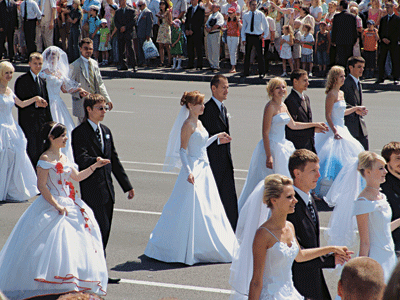
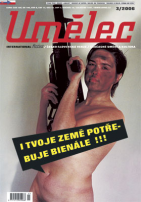





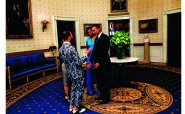
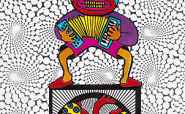
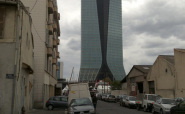
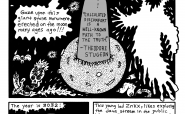







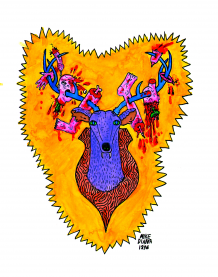





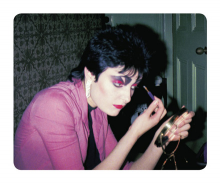
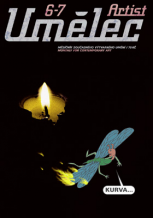



 New book by I.M.Jirous in English at our online bookshop.
New book by I.M.Jirous in English at our online bookshop.
Comments
There are currently no comments.Add new comment